A doksi online olvasásához kérlek jelentkezz be!
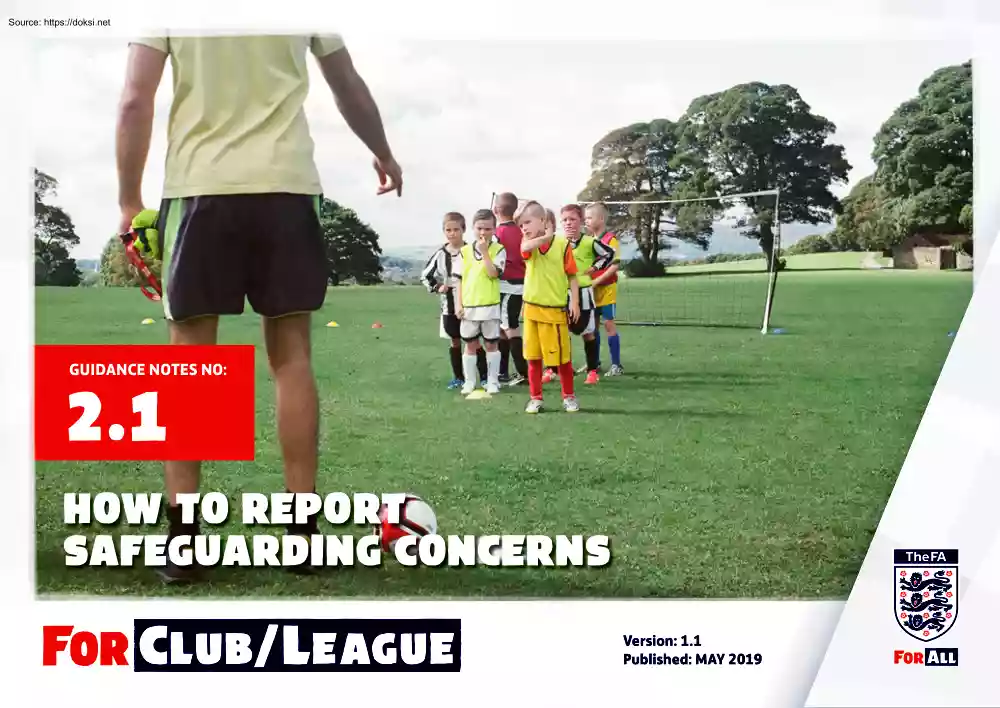
A doksi online olvasásához kérlek jelentkezz be!
Nincs még értékelés. Legyél Te az első!
Mit olvastak a többiek, ha ezzel végeztek?
Tartalmi kivonat
GUIDANCE NOTES NO: 2.1 HOW TO REPORT SAFEGUARDING CONCERNS Version: 1.1 Published: MAY 2019 HOW TO REPORT SAFEGUARDING CONCERNS If you are worried about a child, it’s vital you report your concerns. Doing nothing is not an option. It’s also important you stay calm, and if any child is present, reassure them they are not to blame. But don’t make promises of confidentiality or outcome. There are five ways to report a concern: • To your club or league Designated Safeguarding Officer – please find out from your club who these people are; • To your County FA Designated Safeguarding Officer. Click here for a list of County FA contacts. • By emailing The FA Safeguarding Team at safeguarding@TheFA.com or by calling and asking for the team on 0800 169 1863; • If urgent and you cannot contact your club, league or County FA Designated Safeguarding Officer, you should call the NSPCC 24 hour helpline on 0808 800 5000; • If it is an emergency because a child or
children are at immediate risk, then call the Police or Children’s Social Care in your area. WHISTLE-BLOWING For ways to whistle-blow on malpractice see page 4. 2.1 | HOW TO R EPORT SAF EGUARDING CONCERNS 2 CASE-HANDLING: WHAT IS ABUSE? WHAT IS HAZING? After I’ve reported a concern, then what happens? Concerns identified as child abuse will fall within the following five categories: If reported to a club, league or County FA Designated Safeguarding Officer, they will make an assessment based on their training. • Physical Abuse: A child is physically hurt or injured by an adult, or an adult gives alcohol or drugs to a child or young person; • Neglect: A child’s basic physical needs are consistently not met or they are regularly left alone or unsupervised ; Hazing is any action or situation, with or without the consent of the participants, which recklessly, intentionally, or unintentionally endangers the mental, physical, or emotional wellbeing of a child or
young person. Hazing is not tolerated in affiliated football. • Sexual Abuse: An adult or peer uses a child or young person to meet their own sexual needs; • Emotional Abuse: Persistent criticism, denigrating or putting unrealistic expectations on a child or young person; • Bullying: Persistent or repeated hostile and intimidating behaviour towards a child or young person. The assessment will classify the case as: • High and immediate-risk; • Medium-risk; • Lower-risk or poor practice. If high and immediate-risk: the statutory authorities will be informed and within 24 hours a standard referral form outlining the case will be sent to The FA Safeguarding team. If medium-risk: a referral form will be sent to The FA Safeguarding team within 24 hours and handled on a case-by-case basis. This means it may be referred to the statutory authorities or handled by The FA and relevant County FA in the case of grassroots football, or the DSO if the incident has occurred at
a professional club. If lower-risk or poor practice: it will be handled by the County FA in the case of grassroots football, or the club DSO if the incident occurs at a professional club. Thereafter, just as in a legal case, there are various risk management actions which can be taken by The FA to safeguard children. These include education, mentoring, supervision and, where appropriate, suspensions. WITHIN FOOTBALL POOR PRACTICE IS DEFINED AS: • When insufficient care is taken to avoid injuries (e.g by excessive training or inappropriate training for the age, maturity, experience and ability of players); • Allowing abusive or concerning practices to go unreported (e.g a coach who ridicules and criticizes players who make a mistake during a match); • Allowing hazing practices to go unreported; • Placing children or young people in potentially compromising and uncomfortable situations with adults (e.g inappropriate use by a coach of social media with a young player(s);
• Ignoring health and safety guidelines (e.g allowing young players to set up goal posts unsupervised by adults); • Failing to adhere to the club’s codes of practice (e.g openly verbally abusing the referee); • Giving continued and unnecessary preferential treatment to individuals. Please note – this list is not exhaustive. Incidents of poor practice occur when the needs of children and young people are not afforded the necessary priority, so their welfare is compromised. See Guidance Notes 2.2: Safeguarding Referral Form – Affiliated Football 2.1 | HOW TO R EPORT SAF EGUARDING CONCERNS 3 WHISTLE-BLOWING Whistle-blowing in a safeguarding context means revealing and raising concerns over misconduct or malpractice within an organisation, or within an independent structure associated with it. It can be used as an early-warning system or when it’s recognised that appropriate actions have not been taken. This approach or policy is adopted in many different walks
of life. Any adult or young person with concerns about a colleague’s conduct towards a child or young person can also use whistleblowing by calling 0800 169 1863 and asking for The FA’s safeguarding team, or via email to: Safeguarding@TheFA.com Alternatively, concerns can be reported: • Direct to the local Police or Children’s Social Care services, or • The Child Protection in Sport Unit at cpsu@nspcc.orguk, or The NSPCC Helpline on 0808 800 5000 or email: help@nspcc.orguk 2.1 | HOW TO R EPORT SAF EGUARDING CONCERNS 4 13779
children are at immediate risk, then call the Police or Children’s Social Care in your area. WHISTLE-BLOWING For ways to whistle-blow on malpractice see page 4. 2.1 | HOW TO R EPORT SAF EGUARDING CONCERNS 2 CASE-HANDLING: WHAT IS ABUSE? WHAT IS HAZING? After I’ve reported a concern, then what happens? Concerns identified as child abuse will fall within the following five categories: If reported to a club, league or County FA Designated Safeguarding Officer, they will make an assessment based on their training. • Physical Abuse: A child is physically hurt or injured by an adult, or an adult gives alcohol or drugs to a child or young person; • Neglect: A child’s basic physical needs are consistently not met or they are regularly left alone or unsupervised ; Hazing is any action or situation, with or without the consent of the participants, which recklessly, intentionally, or unintentionally endangers the mental, physical, or emotional wellbeing of a child or
young person. Hazing is not tolerated in affiliated football. • Sexual Abuse: An adult or peer uses a child or young person to meet their own sexual needs; • Emotional Abuse: Persistent criticism, denigrating or putting unrealistic expectations on a child or young person; • Bullying: Persistent or repeated hostile and intimidating behaviour towards a child or young person. The assessment will classify the case as: • High and immediate-risk; • Medium-risk; • Lower-risk or poor practice. If high and immediate-risk: the statutory authorities will be informed and within 24 hours a standard referral form outlining the case will be sent to The FA Safeguarding team. If medium-risk: a referral form will be sent to The FA Safeguarding team within 24 hours and handled on a case-by-case basis. This means it may be referred to the statutory authorities or handled by The FA and relevant County FA in the case of grassroots football, or the DSO if the incident has occurred at
a professional club. If lower-risk or poor practice: it will be handled by the County FA in the case of grassroots football, or the club DSO if the incident occurs at a professional club. Thereafter, just as in a legal case, there are various risk management actions which can be taken by The FA to safeguard children. These include education, mentoring, supervision and, where appropriate, suspensions. WITHIN FOOTBALL POOR PRACTICE IS DEFINED AS: • When insufficient care is taken to avoid injuries (e.g by excessive training or inappropriate training for the age, maturity, experience and ability of players); • Allowing abusive or concerning practices to go unreported (e.g a coach who ridicules and criticizes players who make a mistake during a match); • Allowing hazing practices to go unreported; • Placing children or young people in potentially compromising and uncomfortable situations with adults (e.g inappropriate use by a coach of social media with a young player(s);
• Ignoring health and safety guidelines (e.g allowing young players to set up goal posts unsupervised by adults); • Failing to adhere to the club’s codes of practice (e.g openly verbally abusing the referee); • Giving continued and unnecessary preferential treatment to individuals. Please note – this list is not exhaustive. Incidents of poor practice occur when the needs of children and young people are not afforded the necessary priority, so their welfare is compromised. See Guidance Notes 2.2: Safeguarding Referral Form – Affiliated Football 2.1 | HOW TO R EPORT SAF EGUARDING CONCERNS 3 WHISTLE-BLOWING Whistle-blowing in a safeguarding context means revealing and raising concerns over misconduct or malpractice within an organisation, or within an independent structure associated with it. It can be used as an early-warning system or when it’s recognised that appropriate actions have not been taken. This approach or policy is adopted in many different walks
of life. Any adult or young person with concerns about a colleague’s conduct towards a child or young person can also use whistleblowing by calling 0800 169 1863 and asking for The FA’s safeguarding team, or via email to: Safeguarding@TheFA.com Alternatively, concerns can be reported: • Direct to the local Police or Children’s Social Care services, or • The Child Protection in Sport Unit at cpsu@nspcc.orguk, or The NSPCC Helpline on 0808 800 5000 or email: help@nspcc.orguk 2.1 | HOW TO R EPORT SAF EGUARDING CONCERNS 4 13779
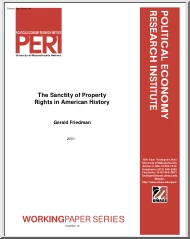
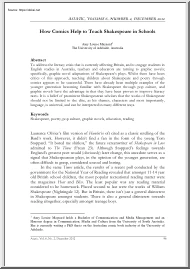
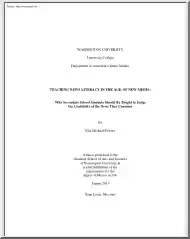
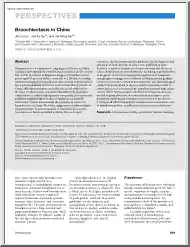
 Ahogy közeledik a történelem érettségi, sokan döbbennek rá, hogy nem készültek fel eléggé az esszéírás feladatra. Módszertani útmutatónkban kitérünk a történet térbeli és időbeli elhelyezésére, a források elemzésére és az eseményeket alakító tényezőkre is.
Ahogy közeledik a történelem érettségi, sokan döbbennek rá, hogy nem készültek fel eléggé az esszéírás feladatra. Módszertani útmutatónkban kitérünk a történet térbeli és időbeli elhelyezésére, a források elemzésére és az eseményeket alakító tényezőkre is.